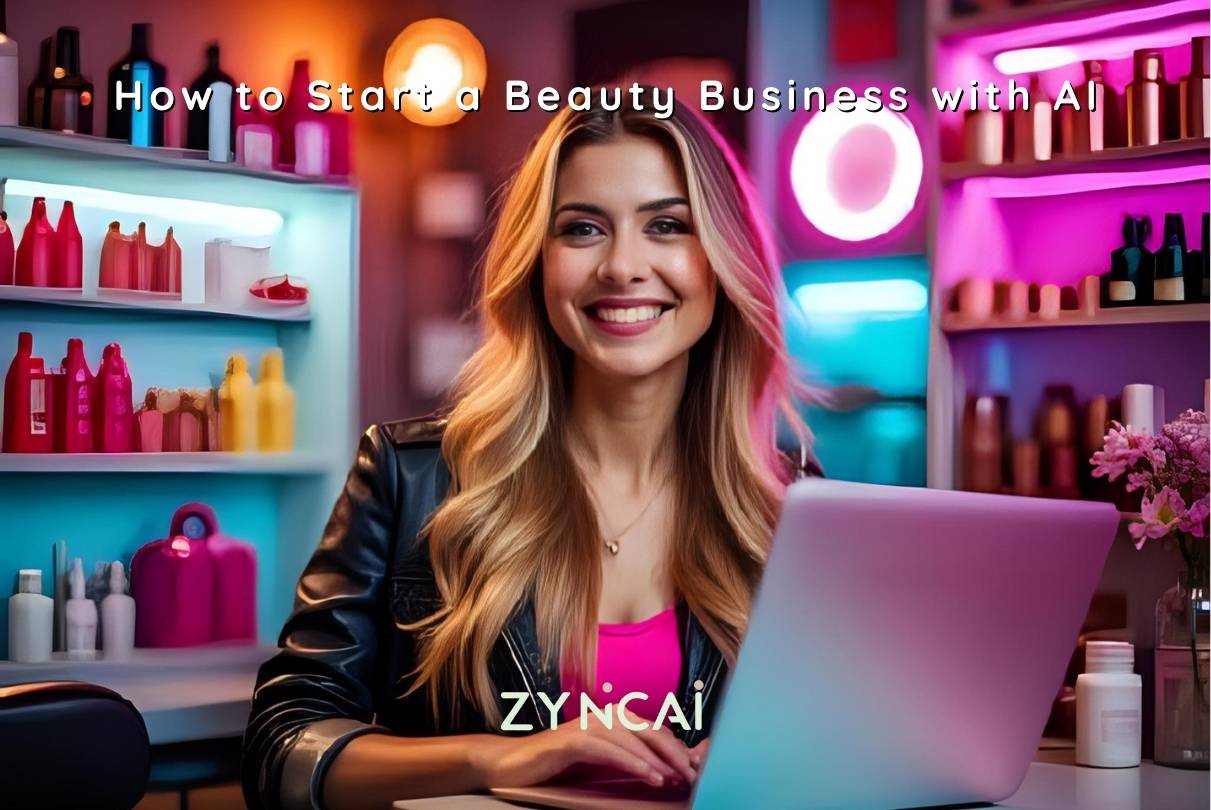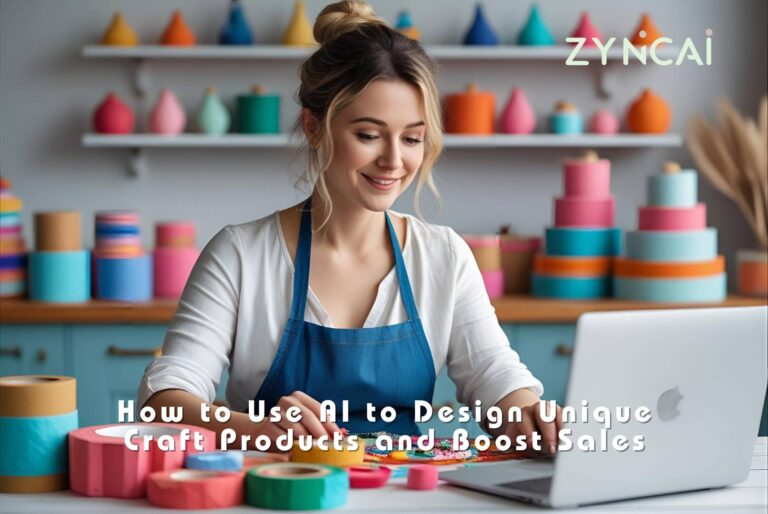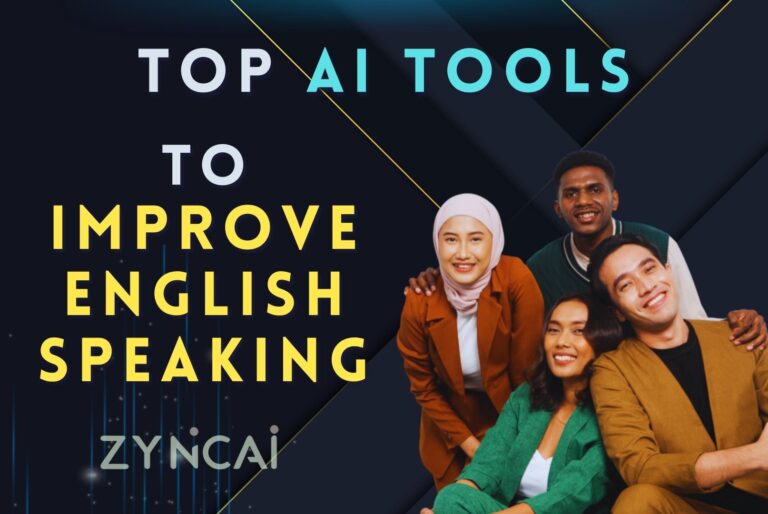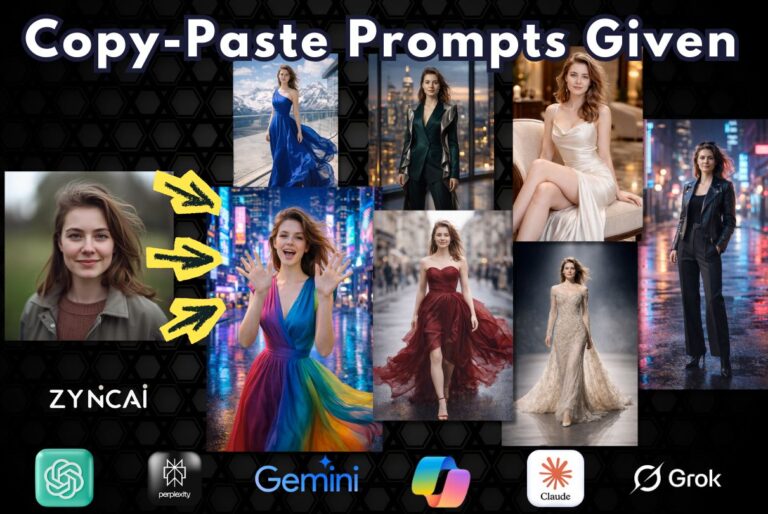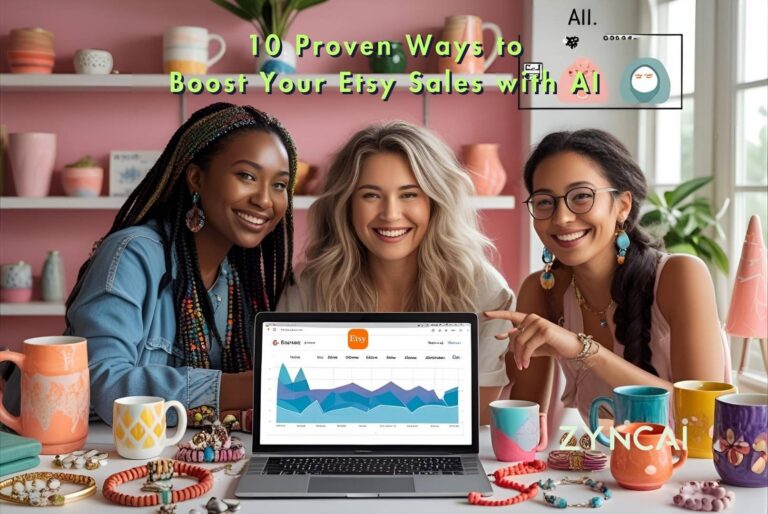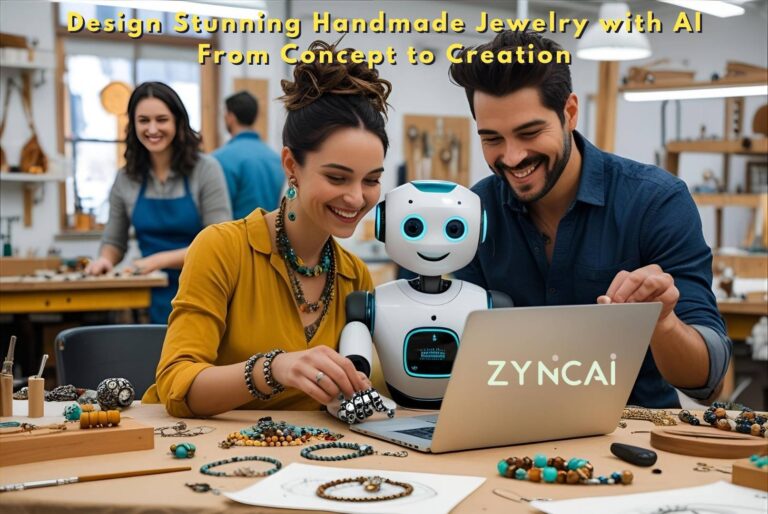How to Start a Beauty Business with AI [Step-by-Step 2026 Guide]
Starting a beauty business is a dream for many, but the reality often feels overwhelming. From choosing the right products, right suppliers to building a brand and also to attract loyal customers, the challenges can pile up on top of the other. Also, the beauty industry is highly competitive, meaning it is easy to get lost in the crowd without a solid strategy. Balancing creativity with the demands of running a business can feel like a constant uphill battle for new entrepreneurs.
This is where AI comes in to completely change the game. Imagine having tools that can predict beauty trends, recommend the right products for your customers, automate your marketing, or even manage bookings and customer service for you. AI is not just about saving time, it is truly about giving you the ability to compete with bigger brands while staying focused on what you love most.
In this guide, we will walk you step by step through how to start a beauty business with AI, from setting up the foundation to scaling with smart technology. AI can help you stand out, work smarter, and grow faster no matter you are launching a skincare line, opening a salon, or starting an online beauty store. By the end, you will see exactly how to turn your beauty business idea into a thriving brand powered by innovation.
Why AI is the Future of Beauty Businesses
AI is transforming the beauty industry in ways you and me could not imagine a few years ago. Traditional beauty businesses rely heavily on manual effort, no matter it was on understanding customer needs, running campaigns, or predicting what products will sell. But with AI, these time consuming tasks become smarter and more accurate. AI gives potential beauty entrepreneurs like you the tools for various activities in the business such as on analyzing skin types, recommending personalized products to automating marketing strategies. These will help you to compete with larger brands without the massive budgets. Simply it is like having a personal assistant, strategist, and analyst all in one.
The future of beauty businesses belongs to those who embrace technology. Customers today expect convenience, personalization, and innovation, and AI delivers all three. By leveraging AI in the correct manner, you can build stronger customer relationships, create unique experiences, and make smarter decisions that drive growth. Using AI ensures you do not just keep up with the industry, you stay ahead of it.
Below is why AI is the future of beauty businesses,
- Personalization at scale: Tailored product recommendations for every customer.
- Trend forecasting: AI predicts upcoming beauty trends before they go mainstream.
- Smart marketing: Automated campaigns that target the right audience at the right time.
- Better customer service: AI chatbots and booking systems that improve convenience.
- Efficient operations: Automated inventory and financial management.
- Competitive edge: Small businesses can compete with big brands more effectively.
Benefits of Using AI in Your Beauty Business
Using AI in your beauty business is simpler than it sounds. It is like having a smart assistant that helps you every step of the way. It can suggest the right products for each customer, answer questions through chatbots, and even run marketing campaigns while you focus on your passion. AI takes care routing work for you, so you can give more attention to your customers and grow your business with less stress.
- Personalized customer experience: AI tools can analyze skin, hair, or beauty needs and suggest the perfect products.
- Cost reduction and automation: Chatbots, virtual try ons, and automated bookings save both time and money.
- Smarter marketing and data driven decisions: AI studies customer behavior so you can promote the right products at the right time.
- Scalability and competitive advantage: Easily expand your business and compete with big brands without a huge budget.
- 24/7 customer support: AI chatbots answer customer questions anytime, keeping clients happy.
- Inventory management: AI predicts which products will sell, so you do not overstock or run out.
- Trend forecasting: Stay ahead by knowing the latest beauty trends before your competitors.
- Improved customer loyalty: Personalized recommendations make clients feel valued and keep them coming back.
Step-by-Step Guide to Starting a Beauty Business with AI
Step 1: Identify Your Niche
Starting a beauty business without choosing a niche is like walking into a beauty store with no idea what you are looking for. It is overwhelming, confusing, and hard to make progress. Your niche is the foundation of your brand. It defines who your customers are, what problems you solve, and how you stand out in a crowded market. You can build stronger customer loyalty, make smarter marketing decisions, and position yourself as an expert in your space when you narrowing your focus.
Popular Beauty Niches to Consider
The beauty industry is wide and diverse. Here are some popular niches you can explore,
- Skincare: Organic and natural skincare, anti aging, acne solutions, or luxury treatments.
- Makeup: Everyday essentials, bold artistry, cruelty free lines, or professional kits.
- Haircare: Natural shampoos, scalp care, hair growth products, or styling solutions.
- Nail Care: Eco friendly nail polishes, nail extensions, at home manicure kits, or artistic designs.
- Beauty Tech Services: AI driven skin analysis, AR / VR makeup tryons, or smart beauty devices.
Aligning Passion with Market Demand
It is not enough to just pick a niche, you need one that balances what you love with what customers actually want.
Step 1: Reflect on your passion
- Which area of beauty excites you most?
- Do you enjoy creating, educating, or innovating in this space?
Step 2: Research customer needs
- Use AI tools to analyze search trends and social media conversations.
- Find out what customers are struggling with or asking for.
Step 3: Check the competition
- Look at competitors in your chosen niche, are there gaps they are missing?
- Study reviews to see where customers feel unsatisfied.
Step 4: Validate with data
- Confirm demand with AI powered market research.
- Run small surveys or test campaigns before committing fully.
Questions to Ask Yourself Before Choosing a Niche
- Which beauty area am I truly passionate about?
- Who is my ideal customer? It can be teens, working professionals, eco conscious buyers, or luxury seekers?
- Can I solve a real problem for my audience?
- Do I want to sell products, offer services, or combine both?
- Is there space in the market for me to stand out with AI powered solutions?
Signs of a Strong Niche
- Steady or growing customer demand.
- Low to moderate competition.
- Clear customer pain points that need solving.
- Long term growth opportunities.
- Room to use AI tools for innovation.
AI Tools to Help Identify Your Niche
- Google Trends & Exploding Topics: Spot fast rising beauty topics before they go mainstream.
- ChatGPT, Gemini, or Jasper AI: Brainstorm niche ideas, customer personas, and marketing angles.
- AnswerThePublic: Find the exact beauty questions customers are asking online.
- SEMRush or Ahrefs: Analyze keyword volume, competition, and search intent.
- Trendalytics: AI powered tool designed specifically for trend forecasting in beauty and fashion.
- Crayon AI: Monitor competitors and discover gaps you can fill.
Step 2: Conduct Market Research with AI Tools
Once you have identified your beauty niche, the next step is to understand the market you are stepping into. Market research is the key to knowing what your customers want, where opportunities lie, and how you can stand out from competitors. Traditionally, this process takes weeks of surveys, spreadsheets, and guesswork. Simply now you can get accurate insights in minutes with AI!
AI takes the guesswork out of building a strong business strategy, from analyzing competitors to predicting beauty trends.
Using AI for Competitor Analysis
You must to know what others in your niche are doing to be successful, and identify how you can do it better. This is simply the competitor analysis. AI makes competitor analysis faster and smarter by showing you where they are strong, where they are weak, and what strategies they are using.
What to Look For
- Which products or services are their bestsellers.
- How they price and position their offers.
- Customer feedback of what people love and what they complain about.
- Marketing channels they use (social media, email, influences, etc.).
AI Tools for Competitor Research
- Crayon AI: Tracks competitor campaigns, pricing changes, and new product launches.
- SimilarWeb: Analyzes competitor website traffic and audience behavior.
- SEMRush / Ahrefs: Find the keywords competitors rank for and uncover their SEO strategies.
- Sprout Social: Monitors social media performance and engagement of competitor brands.
AI Tools for Predicting Beauty Trends
The beauty industry thrives on trends, and timing is everything. You can launch products and campaigns before the competition, when you can spot trends early. AI powered trend forecasting tools scan millions of data points across social media, online searches, and industry reports to highlight what’s coming next.
How AI Helps You Stay Ahead
- Identifies rising beauty ingredients (like niacinamide or bakuchiol).
- Tracks trending styles (natural makeup, bold nails, or clean beauty).
- Predicts seasonal demands (summer skincare, holiday gift sets).
- Highlights shifts in customer behavior and preferences.
AI Tools for Trend Forecasting
- Trendalytics: Beauty and fashion-focused trend analysis.
- Exploding Topics: Finds new topics gaining traction in beauty.
- Google Trends: Shows real time search demand for products or keywords.
- WGSN: AI driven forecasting for global beauty and wellness trends.
Customer Persona Creation with AI Analytics
Understanding your customers is at the heart of successful beauty businesses. AI helps you create detailed customer personas instrad of relying on assumptions.
What AI Can Tell You About Customers
- Age, gender, and lifestyle preferences.
- Skin, hair, or makeup needs.
- Shopping habits (online vs. in-store, luxury vs. budget).
- Influencers and social platforms they follow.
- Values they care about (eco friendly, cruelty free, premium quality).
AI Tools for Customer Insights
- HubSpot AI: Helps build detailed customer personas with CRM data.
- Clarabridge: Analyzes customer feedback and reviews for insights.
- Google Analytics with AI reports: Understands customer behavior on your website.
- Sprinklr AI: Monitors customer conversations across social media.
Step 3: Build a Business Plan Powered by AI
After identifying your niche and understanding your market, the next crucial step is creating a solid business plan. A strong plan acts like a roadmap, guiding your decisions, strategies, and growth. Traditionally, business planning involves countless spreadsheets, assumptions, and long hours of research. But now AI changed the game.
You can now forecast finances, validate your business model, and reduce risks more accurately and efficiently than ever before, with using AI-powered tools.
Financial Forecasting with AI
Predicting revenue, expenses, and growth can be tricky, specially in a competitive beauty market. AI simplifies this by analyzing data from multiple sources to give realistic financial projections. You can quickly see which products or services are likely to perform well, forecast seasonal trends, and plan for cash flow.
Benefits of AI for Financial Forecasting
- Predicts sales trends based on historical and market data.
- Helps plan inventory purchases to avoid overstocking or shortages.
- Provides cost estimates for marketing, operations, and staffing.
- Offers scenario planning for best case, worst case, and realistic projections.
AI Tools for Financial Forecasting
- Fathom: AI powered financial analysis and forecasting.
- PlanGuru: Budgeting, forecasting, and financial planning for small businesses.
- LivePlan: Helps create dynamic financial projections with AI insights.
- QuickBooks with AI features: Provides predictive cash flow and expense insights.
AI Assisted Business Model Validation
It is essential to validate your business model prior investing too much time or money. AI can simulate different strategies, helping you determine which approach is likely to succeed. It analyzes customer behavior, market trends, and competitor strategies to give data backed recommendations.
How AI Supports Business Model Validation
- Tests pricing strategies and revenue streams.
- Predicts customer demand for different products or services.
- Identifies the most profitable target audience segments.
- Simulates marketing campaigns to forecast ROI.
AI Tools for Model Validation
- GrowthBot: AI insights for marketing, sales, and business strategy.
- Crayon AI: Tracks competitors and highlights market gaps.
- Tableau with AI: Visualizes data trends and predicts outcomes.
- HubSpot AI: Analyzes customer behavior and helps test product / service models.
How AI Reduces Risks in Planning
Every new business involves risk, but AI minimizes uncertainty by providing actionable insights. You can make informed decisions backed by data instead of guessing what works. AI will help you identify potential pitfalls early and adjust your plan before costly mistakes happen.
Ways AI Can Reduces Risk
- Detects patterns in customer behavior that humans might miss.
- Highlights market shifts before they impact your business.
- Optimizes operations and marketing strategies to prevent losses.
- Helps you adapt quickly to unexpected changes in demand or competition.
Step 4: Leverage AI for Product Development
Once your business plan is ready, the next step for you is to develop products that truly resonate with your customers. In the beauty industry, creating effective and innovative products will be much time consuming, expensive, and full of trial and error. AI changes this by streamlining product development, helping you formulate better products faster, analyze ingredients, and even create personalized solutions for customers.
Small beauty brands can compete with major players and deliver high-quality products with confidence by leveraging AI correctly.
AI Driven Skincare Formulation and Testing
Formulating skincare or cosmetic products involves understanding how ingredients interact and what works best for different skin types. AI accelerates this process by predicting ingredient combinations, testing formulations virtually, and optimizing for safety and effectiveness before physical testing.
Benefits of AI in Product Formulation
- Speeds up the R&D process, reducing costs and time.
- Identifies ingredient combinations that are effective and safe.
- Suggests improvements based on scientific data and consumer preferences.
- Enables rapid prototyping of multiple formulations.
AI Tools for Skincare and Cosmetic Formulation
- BASF Beauty AI: Uses AI to optimize cosmetic formulations.
- PharmaTrack AI: Predicts ingredient compatibility and product stability.
- P&G AI Lab: AI-powered R&D for product innovation.
AI Powered Ingredient Analysis
Understanding the effects of each ingredient is crucial for you to create safe, effective, and high performing products. AI can analyze thousands of ingredients in seconds, identify potential allergens or irritants, and even suggest substitutes that improve product performance.
Benefits of AI for Ingredient Analysis
- Ensures products are safe for all skin types.
- Highlights natural or trending ingredients that appeal to consumers.
- Reduces trial and error testing and saves costs.
- Helps comply with regulations faster by predicting ingredient impact.
AI Tools for Ingredient Analysis
- Cosmetify AI: Analyzes product formulations and suggests improvements.
- IBM Watson for Life Sciences: AI driven analysis for ingredient research.
- Biorasi AI: Identifies ingredient interactions and safety profiles.
Case Studies: AI Startups Creating Custom Beauty Products
AI is not just a theoretical tool, it is already reshaping beauty product development. Several startups are using AI to offer personalized skincare and cosmetics:
- Atolla: Uses AI and customer data to create custom serums tailored to individual skin types.
- Proven Skincare: AI analyzes lifestyle, environment, and skin concerns to recommend personalized products.
- Function of Beauty: AI formulates customized haircare products based on detailed customer questionnaires.
These examples show that AI allows brands to deliver truly personalized, data-driven products that can help you in many ways to meet customer needs.
Step 5: Set Up Your Online Presence with AI Tools
In today’s beauty industry, a strong online presence is essential. Your website, social media profiles, and customer communication channels are often the first interaction potential clients have with your brand. Building and managing this presence can feel overwhelming, especially for new entrepreneurs. Luckily, AI tools make it simpler to create a professional looking brand, automate content, and provide excellent customer service, all without a huge team or budget.
AI Website Builders & Branding Design
Your website is the foundation of your online presence, and your brand identity makes your business memorable. AI powered website builders and branding tools can help you design a beautiful site and cohesive brand visuals quickly.
Benefits of AI in Website & Branding
- Generates professional website designs in minutes.
- Suggests color schemes, logos, and fonts that match your brand personality.
- Optimizes layout and user experience for better conversions.
- Keeps your branding consistent across all online channels.
AI Tools for Website & Branding
- Wix AI Website Builder: Creates custom websites automatically based on your inputs.
- Looka: AI logo and brand design tool for creating cohesive visual identities.
- Canva AI: Design social posts, banners, and marketing visuals effortlessly.
- Bookmark: AI driven website builder with smart suggestions for design and layout.
Social Media Automation & AI Content Creation
Maintaining active social media accounts can be time consuming, but AI can handle content creation and scheduling, helping you stay consistent and engaging with your audience.
Benefits of AI in Social Media
- Generates captions, posts, and video scripts tailored to your niche.
- Schedules posts at optimal times for maximum engagement.
- Provides performance analytics to improve content strategy.
- Suggests trending hashtags and topics to boost reach.
AI Tools for Social Media
- Lately AI: Converts blogs or videos into social media posts.
- Jasper AI: AI powered content writing for captions, posts, and ad copy.
- Buffer / Hootsuite with AI: Schedules posts and provides AI driven analytics.
- Promo.com AI: Creates AI generated short videos for beauty campaigns.
AI Chatbots for Customer Service
Providing quick, helpful responses to customers is crucial for building trust and loyalty. AI chatbots can manage inquiries, guide visitors, and even recommend products, 24/7, without human intervention.
Benefits of AI Chatbots
- Respond instantly to FAQs and customer concerns.
- Guide users to products or services based on their preferences.
- Capture leads and grow your email list automatically.
- Reduce workload for your team while improving customer experience.
AI Tools for Customer Service
- Tidio AI: AI chatbot for beauty e commerce and websites.
- ManyChat: Automates messaging on Facebook, Instagram, and WhatsApp.
- Zendesk AI: AI powered customer support and ticketing system.
- Drift AI: Conversational AI for capturing leads and helping customers.
Step 6: Launch & Market Your Beauty Business with AI
You have identified your niche, developed products, and built an online presence. Now it is time for you to launch and get your beauty brand in front of the right audience. Marketing can be one of the most time consuming and challenging parts of running a business. But AI will make it smarter, faster, and more effective for you!
AI gives you the tools to reach customers, build trust, and grow your brand, starting from creating campaigns to optimizing content to leveraging virtual influencers.
AI Driven Marketing Campaign
AI can help you design, execute, and monitor marketing campaigns across multiple channels like email, social media, and paid ads. Campaigns are data-driven, more personalized, and optimized for better engagement and conversions with using AI.
Benefits of AI in Marketing Campaigns
- Personalized email campaigns based on customer preferences and behavior.
- Social media ads that target the right audience segments.
- Predictive analytics to forecast which campaigns will perform best.
- Automated A/B testing to continuously improve results.
AI Tools for Marketing Campaigns
- Mailchimp AI: Personalized email campaigns and audience segmentation.
- AdCreative.ai: Generates ad creatives optimized for conversions.
- Hootsuite with AI: Schedules posts and analyzes engagement for social campaigns.
- HubSpot AI: Helps automate marketing workflows and track performance.
Using AI to Optimize SEO and Content Creation
SEO and content marketing are crucial for driving traffic to your website and building brand authority. AI tools make creating content and optimizing it for search engines faster and smarter.
Benefits of AI for SEO and Content
- Generates blog posts, product descriptions, and social media content quickly.
- Optimizes content for target keywords to improve search rankings.
- Provides topic suggestions based on trending searches in the beauty niche.
- Monitors content performance and suggests improvements over time.
AI Tools for SEO & Content Creation
- Jasper AI: Creates SEO-optimized blogs, product descriptions, and social posts.
- SurferSEO: AI driven content optimization and keyword analysis.
- Writesonic: AI content creation for blogs, ads, and social media.
- Frase AI: Researches topics, generates content, and optimizes for SEO.
Virtual Influencers & AI in Social Media Marketing
AI is also transforming influencer marketing. Virtual influencers, computer generated personalities can engage audiences, promote products, and create unique campaigns without the constraints of real life influencers. They are perfect for brands wanting innovative marketing strategies.
Benefits of Virtual Influencers & AI Marketing
- Creates unique and on brand content consistently.
- Engages niche audiences with creative storytelling.
- Reduces dependency on high cost influencer partnerships.
- Offers full control over messaging, visuals, and campaign scheduling.
Examples & AI Tools
- Lil Miquela: A virtual influencer promoting beauty and lifestyle brands.
- Shudu: AI generated model for luxury beauty campaigns.
- Synthesia: AI video generation for social media and marketing content.
- Rephrase.ai: Converts text into AI generated videos for ads and promos.
Step 7: Use AI for Customer Personalization
In the beauty industry, personalization is key for you to win loyal customers. Today’s consumers expect tailored experiences that cater to their unique preferences, skin type, and style. AI makes this possible by offering virtual try ons, skincare analysis, and product recommendations, all designed to make shopping more interactive, accurate, and enjoyable. You not only enhance the customer experience but also increase conversions and build long term loyalty.
Virtual Try-On (AR / AI Makeup Apps)
Virtual try on apps use AI and augmented reality to let customers see how makeup products, hairstyles, or nail colors look on them in real time. This reduces hesitation, builds confidence in buying, and creates a fun, interactive shopping experience.
Benefits of Virtual Try On
- Allows customers to experiment without physical products.
- Reduces product returns and dissatisfaction.
- Enhances engagement on your website and social media.
- Creates shareable experiences that boost brand visibility.
AI Tools for Virtual Try On
- YouCam Makeup: Virtual makeup try on and AR beauty experiences.
- ModiFace: AI driven AR solutions for makeup, hair, and skincare.
- Perfect Corp: Offers AI powered beauty AR apps for brands.
AI Skincare Analysis Apps
AI skincare apps analyze a customer’s skin type, concerns, and conditions to provide personalized product recommendations. These AI apps ensure users get solutions that work for them by leveraging machine learning and image recognition.
Benefits of AI Skincare Analysis
- Provides accurate skin assessments without in person consultations.
- Suggests tailored products for issues like acne, dryness, or aging.
- Encourages repeat purchases through personalized recommendations.
- Builds customer trust with reliable, science backed advice.
AI Tools for Skincare Analysis
- Atolla: Customizes serums based on skin data and feedback.
- HiMirror: AI powered mirror that analyzes skin condition.
- SkinAI: Scans skin and provides product recommendations.
Product Customization with AI Recommendations
AI can also help customers create customized products based on their preferences, habits, and data, which is beyond skincare and makeup. Personalization like this makes customers feel valued and sets your brand apart.
Benefits of AI Product Customization
- Delivers products tailored to individual preferences.
- Increases customer satisfaction and loyalty.
- Encourages higher spending with upsells and personalized bundles.
- Provides actionable insights for future product development.
AI Tools for Product Customization
- Function of Beauty: Personalized haircare products created with AI analysis.
- Proven Skincare: AI analyzes lifestyle and skin data for custom formulations.
- Cove: AI powered platform for custom beauty products based on user input.
Step 8: Scale and Grow Your Beauty Business with AI Insights
Once your beauty business is up and running, the next step is growth. Scaling a business can be challenging. It includes expanding product lines, managing inventory, maintaining quality, and keeping customers happy requires careful planning.
AI helps you grow smarter, not harder. AI can help you by providing insights and automation that guide your strategies, optimize operations, and build long term loyalty. You can make data driven decisions that reduce risk and maximize opportunities by leveraging AI.
Using Predictive Analytics for Growth Strategies
Predictive analytics uses AI to analyze past performance, customer behavior, and market trends to forecast future opportunities. This helps you make informed decisions on product launches, marketing campaigns, and expansion strategies.
Benefits of Predictive Analytics
- Identifies which products or services will likely perform best.
- Forecasts seasonal demand and sales trends.
- Highlights customer segments most likely to convert.
- Helps plan marketing campaigns with higher ROI.
AI Tools for Predictive Analytics
- Tableau with AI features: Visualizes data trends and predicts outcomes.
- HubSpot AI: Analyzes customer behavior to guide growth strategies.
- IBM Watson Analytics: Provides AI driven insights for business expansion.
AI Powered Inventory and Supply Chain Management
Managing inventory and supply chains manually can lead to overstocking, stock outs, and unnecessary costs. AI streamlines this process by predicting demand, optimizing stock levels, and improving supply chain efficiency.
Benefits of AI in Inventory & Supply Chain
- Predicts demand accurately to prevent overstock or shortages.
- Optimizes purchasing and production schedules.
- Reduces waste and lowers operational costs.
- Monitors supply chain risks and suggests solutions proactively.
AI Tools for Inventory & Supply Chain Management
- NetSuite AI: AI driven inventory and resource planning.
- Zoho Inventory with AI: Automates inventory tracking and forecasting.
- Llamasoft AI: Optimizes supply chain performance with predictive insights.
Building Long Term Customer Loyalty with AI Tools
Customer loyalty is the key to sustainable growth. AI helps you understand your customers, personalize experiences, and keep them engaged over time. Loyal customers not only make repeat purchases but also become advocates for your brand.
Benefits of AI for Customer Loyalty
- Sends personalized offers and recommendations based on purchase history.
- Automates loyalty programs and rewards management.
- Tracks customer satisfaction and predicts churn risk.
- Delivers consistent engagement across email, social media, and website.
AI Tools for Customer Loyalty
- Salesforce Einstein: AI powered CRM for personalized customer experiences.
- Klaviyo AI: Automated, personalized email and SMS marketing campaigns.
- Tidio AI: Chatbots for personalized customer support and engagement.
- Yotpo AI: Generates customer insights and manages reviews and loyalty programs.
Best AI Tools for Beauty Entrepreneurs
Running a beauty business today is about more than just creating amazing products. It is also about smart strategies, efficient operations, and personalized experiences. AI tools make it easier for beauty entrepreneurs to innovate, market, sell, and delight customers. The right AI tools can save time, reduce costs, and give you a competitive edge no matter you are just starting out or scaling your brand. Here are some of the best AI solutions across key areas of your beauty business:
AI Product Development Tools
Creating skincare, haircare, or cosmetic products that truly work can be challenging. AI powered product development tools help you analyze ingredients, formulate products, and even personalize them for customers.
Top Tools
- Proven Skincare AI: Analyzes lifestyle, environment, and skin data to create personalized skincare solutions.
- Function of Beauty AI: Customizes haircare formulas using AI insights from customer questionnaires.
- BASF Beauty AI: Optimizes cosmetic formulations for safety, effectiveness, and innovation.
Why It Matters: AI product tools reduce trial-and-error, speed up research, and help small brands create high-quality, personalized products that compete with major players.
AI Marketing & Content Creation Tools
Marketing can take up a huge chunk of your time, but AI makes it smarter and faster. From blog posts to social media content, AI helps you reach the right audience with messages that convert.
Top Tools
- Jasper AI: Generates blogs, social posts, product descriptions, and ad copy tailored to your beauty niche.
- Copy.ai: Creates engaging marketing content, email campaigns, and social media posts.
- Canva AI: Designs stunning visuals, social media posts, and branding graphics with AI assistance.
Why It Matters: With AI, you can consistently produce high-quality content, optimize messaging, and free up time to focus on creativity and customer engagement.
AI E-commerce & Personalization Tools
Personalized shopping experiences are key to standing out in the beauty market. AI can help you offer tailored recommendations, optimize your online store, and increase conversions.
Top Tools:
- Shopify AI: AI powered tools for store design, product recommendations, and sales analytics.
- Revieve: Virtual beauty advisors and AI personalization for skincare, cosmetics, and wellness products.
- Atolla: Custom skincare product recommendations based on AI analysis of user data.
Why It Matters: AI personalization tools help customers feel understood and valued, leading to higher satisfaction, repeat purchases, and loyalty.
AI Customer Experience Tools
Delivering exceptional customer service is essential for building trust and loyalty. AI powered chatbots and virtual assistants can handle inquiries, recommend products, and guide customers, anytime and anywhere.
Top Tools
- Tidio AI: Chatbots for websites and ecommerce stores that provide instant support.
- ManyChat: Automates messaging on Instagram, Facebook, and WhatsApp.
- Zendesk AI: AI powered support and ticketing system for efficient customer service.
- Drift AI: Conversational AI for lead generation, support, and engagement.
Why It Matters: AI customer tools ensure your clients get quick, helpful responses while freeing up your time to focus on growing your business.
Things to Keep in Mind When Using AI for Your Beauty Business
AI can be a game changer for beauty entrepreneurs, but it is important to use it thoughtfully. While AI can save time, reduce costs, and personalize experiences, it is not a replacement for human creativity, intuition, and personal touch. You need to balance AI insights with your own expertise and ensure your tools are aligned with your brand values to get the best results. Being aware of potential pitfalls and planning carefully will help you leverage AI effectively without losing authenticity or connection with your customers.
Key Points to Consider
- AI complements, not replaces, human creativity: Use AI for efficiency and insights, but keep your personal touch in product design, branding, and customer interactions.
- Data privacy matters: Ensure AI tools comply with regulations like GDPR and that customer data is stored securely.
- Quality over quantity: Do not rely on AI to produce endless content or products. Focus on high quality, relevant outputs.
- Test before fully implementing: Always run small pilot campaigns or product trials to see how AI recommendations perform in real world scenarios.
- Stay updated on AI trends: The AI landscape evolves quickly, so regularly explore new tools and features that can improve your business.
- Maintain brand authenticity: Ensure AI generated content or recommendations align with your brand voice and values.
- Monitor AI performance: Track outcomes, analyze results, and adjust strategies as needed to ensure AI is delivering real value.
- Educate your team: Make sure everyone understands how AI tools work and how to use them effectively.
Future of AI in Beauty Industry (2027 & Beyond)
The beauty industry is evolving fast, and AI is at the heart of this transformation. In the next few years, we will see technology not just supporting beauty businesses but actively shaping how products are created, marketed, and experienced. AI will make beauty more personalized, sustainable, and interactive, creating opportunities for brands to connect with customers in ways that were once impossible.
AI powered virtual beauty advisors will become increasingly common, offering personalized skincare and makeup recommendations anytime, anywhere. You can imagine customers getting expert advice through an app or online platform that understands their skin type, preferences, and lifestyle, without needing a human consultant for every interaction.
Sustainability will also get a tech boost. AI can help brands create eco friendly formulations by analyzing ingredients, predicting environmental impact, and optimizing production processes to reduce waste. On top of that, hyper personalized beauty solutions will rise, with products and routines tailored to each individual’s unique needs. From custom skincare serums to AI designed makeup palettes, the possibilities are limitless.
Key AI Trends Shaping the Future of Beauty
- AI powered virtual beauty advisors: Personalized recommendations and consultations via apps and digital platforms.
- AI in sustainable beauty: Eco friendly formulations, waste reduction, and ethical ingredient analysis.
- Hyper personalized beauty solutions: Products and routines designed for individual skin types, lifestyles, and preferences.
- Predictive trend forecasting: AI analyzing social media, reviews, and buying patterns to predict beauty trends.
- Smart retail experiences: AR / AI tryons in stores and online, enhancing customer engagement and satisfaction.
AI is no longer the future, it is already transforming beauty. Brands that adopt AI strategically will not only meet customer expectations but also lead innovation in this rapidly evolving industry.
FAQs: Starting a Beauty Business with AI
Q1. How can AI help in predicting the next big beauty trend?
AI analyzes social media, reviews, and search data to identify emerging trends, helping brands launch products ahead of competitors.
Q2. What AI tools are best for creating personalized skincare products?
Tools like Proven Skincare AI and Revive analyze skin data and customer profiles to recommend or formulate products tailored to individuals.
Q3. Can AI reduce waste in product formulation?
Yes, AI can simulate ingredient combinations and predict outcomes, minimizing trial and error production and reducing material waste.
Q4. How does AI enhance virtual try-on experiences?
AI and AR technology map facial features, skin tone, and hair color in real time, allowing customers to “try” makeup or hairstyles digitally.
Q5. Is AI suitable for small beauty businesses with limited budgets?
Absolutely, many AI tools offer scalable subscription models, allowing small businesses to leverage advanced tech without huge upfront costs.
Q6. How can AI improve customer engagement on social media?
AI can analyze audience behavior, schedule posts, suggest trending content, and even generate captions, increasing engagement rates.
Q7. Can AI predict which products will sell best?
Yes, predictive analytics in AI studies past sales, customer behavior, and market trends to forecast demand accurately.
Q8. How does AI assist with regulatory compliance in beauty formulations?
AI can analyze ingredients against regulatory databases, flagging unsafe compounds and ensuring compliance with local and global laws.
Q9. Are AI-driven chatbots effective for beauty customer service?
Yes, AI chatbots provide instant answers, recommend products, handle bookings, and operate 24/7, improving customer satisfaction.
Q10. Can AI improve email marketing for beauty brands?
AI can personalize email content, optimize send times, segment audiences, and predict which campaigns will convert best.
Q11. How can AI support inventory management?
AI predicts demand, monitors stock levels, and suggests restocking schedules to prevent overstocking or running out of popular products.
Q12. Does AI help in pricing strategy?
Yes, AI analyzes market trends, competitor pricing, and customer behavior to suggest optimal pricing for maximum profit.
Q13. Can AI identify untapped niches in the beauty market?
AI can analyze customer data, search patterns, and social media discussions to reveal underserved segments or emerging needs.
Q14. How can AI help in influencer marketing for beauty brands?
AI identifies suitable influencers based on engagement rates, audience demographics, and niche relevance, improving campaign ROI.
Q15. Can AI create custom product formulations?
Yes, AI can generate formulas based on desired effects, skin types, and ingredient compatibility, accelerating product development.
Q16. How accurate is AI in skin type analysis?
Advanced AI models can analyze images and data with high accuracy, though combining AI insights with expert review ensures optimal results.
Q17. Can AI detect counterfeit beauty products?
AI can track supply chains, scan barcodes, and analyze product data to flag potential counterfeits.
Q18. How does AI improve the e-commerce experience?
AI provides personalized product recommendations, smart search, dynamic pricing, and chat support to enhance online shopping.
Q19. Is AI capable of predicting customer churn?
Yes, AI can identify patterns indicating dissatisfaction or disengagement, enabling brands to take preventive actions.
Q20. Can AI help with sustainability in beauty manufacturing?
AI models can optimize formulas and production processes, reduce packaging waste, and select eco friendly ingredients.
Q21. How does AI improve brand loyalty in the beauty sector?
By personalizing recommendations, sending timely promotions, and offering consistent support, AI strengthens customer relationships.
Q22. Are AI generated product descriptions effective for SEO?
Yes, AI can create optimized, engaging content targeting specific keywords while maintaining a natural tone.
Q23. Can AI support multilingual marketing for global beauty brands?
Absolutely, AI can generate content, translate campaigns, and localize marketing strategies efficiently.
Q24. How can AI help with market entry strategies?
AI analyzes regional trends, consumer behavior, and competitor data to identify the most promising markets for expansion.
Q25. Can AI assist in designing packaging and branding?
Yes, AI tools can generate visual concepts, test color schemes, and evaluate consumer response to branding elements.
Q26. How reliable is AI in predicting long-term beauty trends?
AI provides data driven projections based on historical trends and real-time consumer insights, making predictions more accurate than intuition alone.
Q27. Can AI help reduce product returns in e-commerce?
Yes, personalized recommendations and virtual try on tools increase customer satisfaction and reduce the likelihood of returns.
Q28. How does AI integrate with CRM systems for beauty brands?
AI analyzes customer interactions, predicts needs, and automates follow-ups, enhancing CRM effectiveness and sales conversion.
Q29. Can AI assist in product testing without human trials?
AI simulations and predictive models can test ingredient combinations and product effects, reducing the need for extensive physical trials.
Q30. What are the key challenges when adopting AI in a beauty business?
High upfront costs, data privacy concerns, staff training, and maintaining brand authenticity are main challenges, but strategic planning and phased adoption can overcome them.
